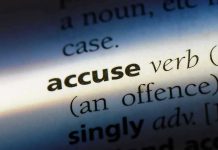
Florida Attorney General James Uthmeier has been found in civil contempt for deliberately defying a federal court order blocking the state’s controversial immigration law, declaring he’s willing to face sanctions to support President Trump’s border security agenda.
Key Takeaways
- Florida Attorney General James Uthmeier was held in civil contempt of court for violating a temporary restraining order against Florida’s new immigration law
- The blocked law would make it a misdemeanor for illegal immigrants to enter Florida, aligning with President Trump’s immigration agenda
- Despite a clear federal court order, Uthmeier sent a memo to law enforcement suggesting they could still enforce the blocked immigration law
- As punishment, Uthmeier must now file bi-weekly reports documenting any arrests made under the contested law
- Uthmeier has publicly stated he’s willing to accept contempt charges to defend the state’s immigration enforcement efforts
Florida’s Immigration Battle Intensifies
U.S. District Judge Kathleen Williams found Florida Attorney General James Uthmeier in civil contempt of court for deliberately disregarding her temporary restraining order blocking Florida’s controversial immigration law. The law, signed by Governor Ron DeSantis, would criminalize the presence of illegal immigrants in Florida, making it a state misdemeanor for undocumented individuals to enter the state. The legislation represents a significant state-level effort to address immigration concerns and strengthen Florida’s border security measures in alignment with President Trump’s national immigration agenda.
Judge Williams initially issued the temporary restraining order on April 4 following a lawsuit from the Florida Immigrant Coalition and other advocacy groups. The situation escalated when, despite the court order, the Florida Highway Patrol arrested over a dozen people under the new law, including a U.S. citizen. This prompted the judge to extend the restraining order and demand strict compliance from state officials to prevent further enforcement of the blocked law.
Deliberate Defiance of Court Order
At the center of the controversy is Uth Meier’s apparent willful defiance of the court’s instructions. While initially informing law enforcement about the restraining order, he later sent a contradictory memo suggesting they could continue enforcing the immigration law. In the memo, Uth Meier stated that “no judicial order…properly restrains,” said Kathleen Williams. No lawful, legitimate order currently impedes your agencies from continuing to enforce” the new immigration law, directly undermining the federal court’s authority.
“Litigants cannot change the plain meaning of words as it suits them, especially when conveying a court’s clear and unambiguous order. Fidelity to the rule of law can have no other meaning,” said Kathleen Williams, U.S. District Judge. in her ruling.
The judge’s frustration with the Attorney General’s actions was evident in her ruling, which criticized his attempt to reinterpret her “clear and unambiguous” order. As punishment for the contempt finding, Uthmeier must now file bi-weekly reports documenting any arrests made under the contested law, with the first report due by July 1. This requirement aims to ensure transparency and compliance with the court’s order while the legal battle over the immigration law continues.
Uthmeier Stands Firm Despite Legal Setbacks
Rather than expressing regret for his actions, Uthmeier has taken a defiant stance, publicly embracing the contempt finding as a badge of honor in the fight for stricter immigration enforcement. On social media and in public statements, Florida’s Attorney General has made it clear he sees himself as defending President Trump’s immigration agenda against judicial overreach. His position reflects the growing tension between state-level immigration policies and federal court authority.
“If being held in contempt is what it costs to defend the rule of law and stand firmly behind President Trump’s agenda on illegal immigration, so be it,” stated James Uthmeier, Florida Attorney General.
Legal setbacks have continued to mount against Uthmeier and Florida’s immigration law. The 11th Circuit Court of Appeals denied his request to stay the injunction while it’s being appealed, noting his defiant stance against the judge’s order. The appellate judges wrote, “But we’re mindful that the burden in this posture is for the Attorney General to make a ‘strong showing’ that he is likely to succeed on the merits. And we do not think he tips the balance in his favor.” Despite these decisions, Uthmeier remains committed to defending the law.
















